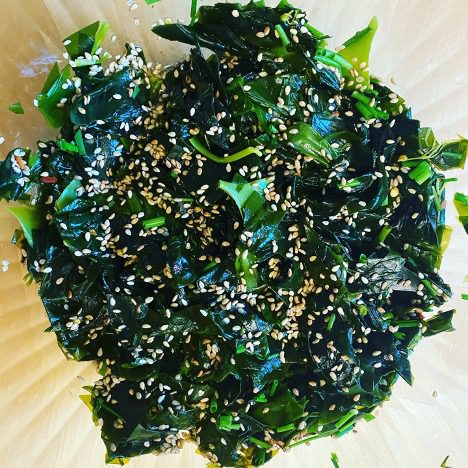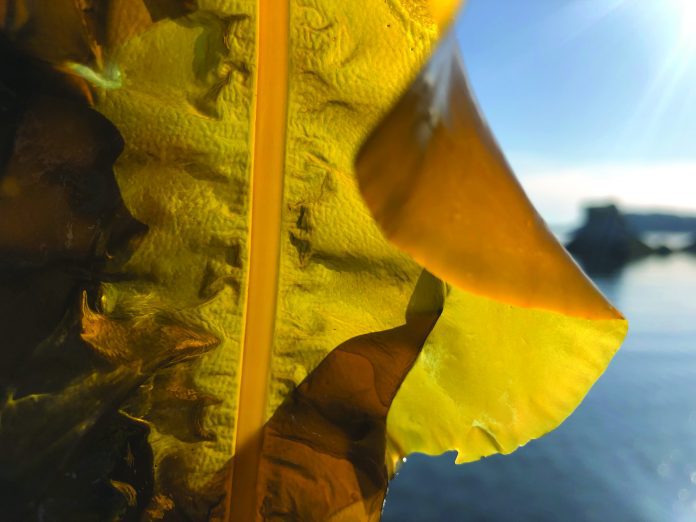By Skye Steritz
For The Cordova Times
Local families, organizations, businesses, and individuals are pulling together to get kelp farming off the ground in the traditional territories of the Eyak, Alutiiq/Sugpiaq, and Tlingit Nations, commonly known as Prince William Sound. Here, mariculture is truly a grassroots effort that will benefit the entire community and the region.
Mariculture is a branch of aquaculture that involves “the cultivation, management, and harvesting of marine organisms,” according to Dr. Lindsay Laird. In the case of kelp farms, cultivation takes place in open water, and involves no enclosures. The season begins in October, when juvenile kelp “sporophytes” are seeded onto lines. Finally, in May, the kelp will be ready to harvest and distribute.
Kelp includes 30 species of sea vegetables. These sea vegetables have the power to improve individual human health, enhance overall food security, sequester carbon from the ocean, provide habitat for fish, and form the foundation for bioplastics.
When consumed, kelp is a rich source of Vitamins A, B12, C, D and E, as well as necessary minerals like zinc, iodine, iron, potassium, magnesium, and calcium. Per serving, kelp contains more calcium than milk. It is also abundant in Omega-3 fatty acids that are extremely beneficial for the immune system and thyroid functioning. Kelp contains 7-12 grams of protein per pound, depending on species.
Kelp is a superfood that is versatile in its culinary uses. One of our favorite ways to eat kelp is in homemade seaweed salad. Simply chop fresh (or thawed) kelp, and mix it with: Sesame oil, soy sauce, rice wine vinegar, minced garlic, diced scallions/green onions, chili flakes, and toasted sesame seeds. This salad is great on its own or as an addition to your favorite poke bowl, rice bowl, or sushi recipe.

The first commercial kelp farms in Alaska began operating in 2017. Four years later, the first commercial kelp farms are getting started in Prince William Sound. McKinley Research Group explains, “Alaska’s seaweed farms are coastal, near-shore operations consisting of seeded lines suspended in the water column by anchors and buoys”.
Two farms will be deploying gear and seeding lines in late October: Noble Ocean Farms and Windy Bay Kelp Farm. Both farms share similar motivations: strengthening food security, supporting ocean health, and growing a delicious, nutrient-dense crop that combats ocean acidification.
Windy Bay Kelp Farm is owned and operated by Thea Thomas, Catherine Herschleb, and Cale Herschleb. In Windy Bay, they will cultivate ribbon kelp (Alaria marginata) and sugar kelp (Saccharina latissima).
Noble Ocean Farms is owned and operated by Sean Den Adel and myself, Skye Steritz. We will grow ribbon, sugar, and bull kelp (Nereocystis luetkeana). All of these are native species of kelp that are found naturally in the Sound.
One of mariculture’s virtues is that it can be restorative to the marine environment, oxygenating water and balancing pH through photosynthesis. Kelp is thought to provide critical habitat for a variety of forage fish species, like herring, serving as feeding and nursery areas during key life cycle stages.
As regenerative kelp farmers, our intent is to work in harmony with the ocean and give back to our community and the world through cultivating high-quality Alaskan kelps. We are working collaboratively to make mariculture a success in our region, and we appreciate the support of our communities as we take this leap! This spring, we will be excited to offer fresh kelp straight from the waters of the Sound.
Skye Steritz is co-owner and operator of Nobile Ocean Farms.






